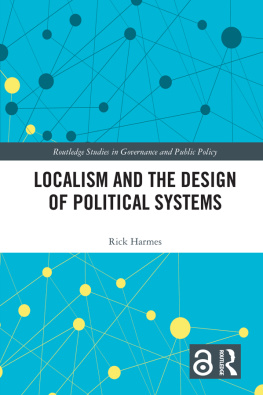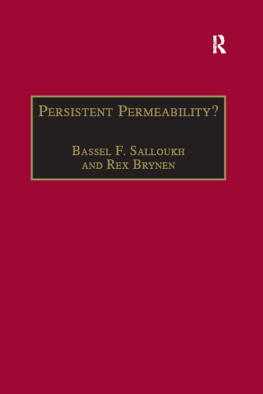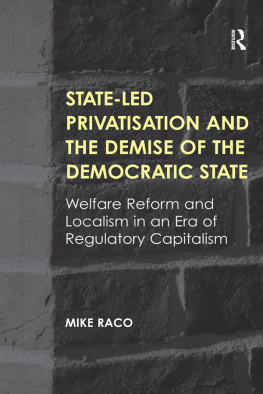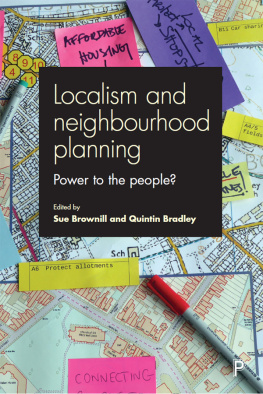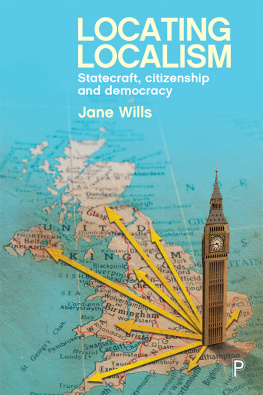Localism and the Design of Political Systems
This book examines localism as a political idea and policy approach and explains what localism is about, why it is growing in importance and how it relates to other themes in politics.
Illustrated with case studies from the United Kingdom, mainland Europe and the Indian sub-continent, the book analyses localism in conceptual and theoretical terms and locates it within the overall landscape of political thought. Key themes covered in the book include place, space and scale; decentralization and devolution; multi-level governance; public value; democracy and empowerment; and political design. With the focus on the bottom-up, constructivist aspects of localism, the book argues that localism is most likely to work successfully in a political order where sovereignty is distributed across various social spheres and levels of government. It offers a comprehensive view of localism by synthesizing its various strands and creating a distinctive framework for design and evaluation.
This book will be of particular interest to scholars, students and practitioners of localism, particularly within local and regional government, public administration and policy, human and political geography, and urban studies.
Rick Harmes is a former teacher and local government officer. He is currently Associate Research Fellow in Politics at the University of Exeter, UK.
Routledge Studies in Governance and Public Policy
Hybrid Public Policy Innovations
Contemporary Policy Beyond Ideology
Edited by Mark Fabian and Robert Breunig
Semiotic Analysis and Public Policy
Connecting Theory and Practice
Christopher L. Atkinson
International Health Worker Migration and Recruitment
Global Governance, Politics and Policy
Nicola Yeates and Jane Pillinger
Challenges to Political Decision-making
Dealing with Information Overload, Ignorance and Contested Knowledge
Hubert Heinelt
Public Enterprise and Local Place
New Perspectives on Theory and Practice
John Fenwick and Lorraine Johnston
Public Administration in Central Europe
Ideas as Causes of Reforms
Edited by Stanisaw Mazur
Middle Class and Welfare State
Making Sense of an Ambivalent Relationship
Marlon Barbehn, Marilena Geugjes, and Michael Haus
Localism and the Design of Political Systems
Rick Harmes
For more information about this series, please visit: www.routledge.com
First published 2021
by Routledge
2 Park Square, Milton Park, Abingdon, Oxon OX14 4RN
and by Routledge
52 Vanderbilt Avenue, New York, NY 10017
Routledge is an imprint of the Taylor & Francis Group, an informa business
2021 Rick Harmes
The right of Rick Harmes to be identified as author of this work has been asserted by him in accordance with sections 77 and 78 of the Copyright, Designs and Patents Act 1988.
With the exception of , no part of this book may be reprinted or reproduced or utilised in any form or by any electronic, mechanical, or other means, now known or hereafter invented, including photocopying and recording, or in any information storage or retrieval system, without permission in writing from the publishers.
. It has been made available under a Creative Commons Attribution-Non Commercial-No Derivatives 4.0 license.
Trademark notice: Product or corporate names may be trademarks or registered trademarks, and are used only for identification and explanation without intent to infringe.
British Library Cataloguing-in-Publication Data
A catalogue record for this book is available from the British Library
Library of Congress Cataloging-in-Publication Data
Names: Harmes, Rick, author.
Title: Localism and the design of political systems / Rick Harmes.
Description: Abingdon, Oxon ; New York, NY : Routledge, 2021. | Series: Routledge studies in governance and public policy | Includes bibliographical references and index.
Identifiers: LCCN 2020037814 (print) | LCCN 2020037815 (ebook) | ISBN 9780367406011 (hardback) | ISBN 9780367810054 (ebook)
Subjects: LCSH: Local governmentCross-cultural studies. | Political planningCross-cultural studies.
Classification: LCC JS78 .H266 2021 (print) | LCC JS78 (ebook) | DDC 320.8dc23
LC record available at https://lccn.loc.gov/2020037814
LC ebook record available at https://lccn.loc.gov/2020037815
ISBN: 978-0-367-40601-1 (hbk)
ISBN: 978-0-367-81005-4 (ebk)
Typeset in Times New Roman
by Apex CoVantage, LLC
Localism and the Design of Political Systems is my first published book, and it represents nearly 50 years of work experience and academic research.
My interest in localism was kindled by a professional career in public services in the UK and Europe, including more than 25 years in English local government. As a teacher, and then as a council manager, I was routinely expected to carry out whatever government policy for my sector happened to be at the time. This was challenging and sometimes frustrating, especially as government policy changed frequently between 1980 and 2008. However, I often had the satisfaction of helping to devise a local or community response to a pressing service issue, or of helping to shape a policy which all the main political parties locally had discussed and were fully agreed on.
More recently, as an academic researcher, I have become particularly interested in the mechanisms by which public policy may be created and driven from the bottom-up, as well as from the top-down. Whatever the source of a particular policy initiative, its implementation has to take place at the individual, community or local level. So it is with that level that my commitment as a researcher continues to lie.
The recent turn to localism speaks to a range of contemporary concerns around governance, policy and theory. As a foundational concept within politics, localism can be approached in a variety of ways. I hope that some of that diversity will be reflected in the account set out in this book.
At the outset, I would like to acknowledge some of the key people and organizations who have supported me with this research project over the past decade.
Firstly, the many academic staff, visiting presenters and students I have come into contact with at the University of Exeter since 2008, and the intellectual stimulation I have received on a wide variety of academic topics during the course of my research. In particular, I want to acknowledge the academic colleagues with whom I have worked most closely during the gestation of this project, including Stephen Wilks, Michael Winter, Dario Castiglione and members of Exeters Political Theory Reading Group, Oli James, and my two PhD supervisors Andrew Massey and Duncan Russel.
Secondly, I want to record my thanks to the councillors, officers and staff at Cornwall Council for the help they have given me over more than a decade of carrying out longitudinal research on their organization. I have received nothing but total support from everyone I have dealt with at the council. My particular thanks go to Rob Andrew and to all his colleagues, past and present, working in Cornwalls localism services. My admiration for their professionalism and their commitment to public service during a period of great challenge for English local government is boundless.

